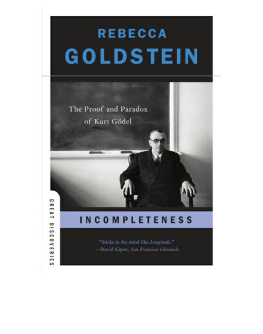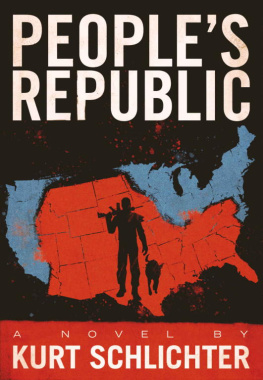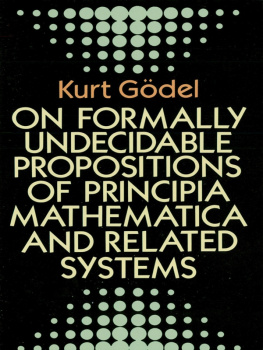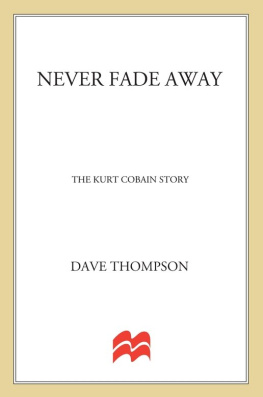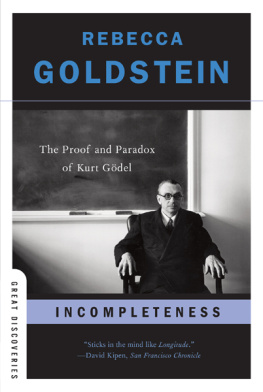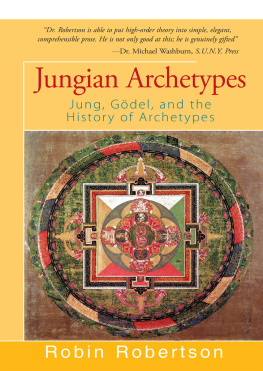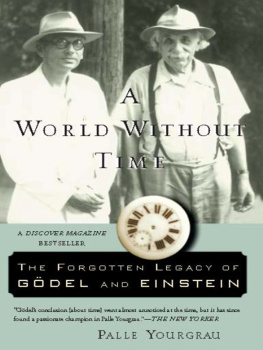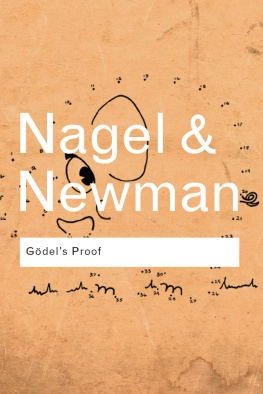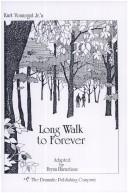

REBECCA GOLDSTEIN
Incompleteness
The Proof and Paradox
of Kurt Gdel

ATLAS BOOKS

W. W. NORTON & COMPANY
NEW YORK LONDON
For Yael
the child is mentor to the mother
But every error is due to extraneous factors (such as emotion and education); reason itself does not err.
KURT GDEL
29 November 1972
Contents
Exiles
I ts late summer in suburban New Jersey. Down a secluded road two men are strolling, hands clasped behind their backs, quietly speaking. Above them a thick canopy of trees shelters them from the sky. Stately old homes stand far back from the road, while on the other side, just beyond the elms, the lush green carpet of a golf course rolls away, the muted voices of men at play coming as if from a great distance.
Yet, appearances to the contrary notwithstanding, this is not just one more suburban enclave strictly populated by the country club set, with men commuting daily into the city to support the affluence. No, this is Princeton, New Jersey, home of one of the great universities of the world, and so possessed of a far more eclectic population than a first glance suggests. At this moment that finds these two men strolling home on a quiet back road, Princetons population has become even more cosmopolitan, with many of Europes finest minds on the run from Hitler. As one American edu-cator put it, Hitler shakes the tree and I gather the apples. Some of the choicest of apples have ended up rolling into this little corner of the world.
So it is not so surprising that the language in which the two strollers are conversing is German. One of the men, dapperly dressed in a white linen suit with a matching white fedora, is still in his thirties while the other, in baggy pants held up by old-world-style suspenders, is approaching seventy. Despite the difference in their ages, they seem to be talking to one another as peers, though occasionally the older mans face crinkles up into a well-worn matrix of amusement and he shakes his head as if the other has now said something wirklich verrckt , really cracked.
At one end of the leafy road, in the direction away from which the two are heading, the spanking new red-brick Georgian building of the Institute for Advanced Study is laid out on a great expanse of lawn. The Institute has been around now for over a decade, renting space in Princeton Universitys Gothic mathematics building. But the brainy influx from Europe has boosted the Institutes prestige, and now it has moved a few short miles from the university onto its own spacious campus, which includes a pond and a small forest, crisscrossed by paths, where fugitive ideas can be run to ground.
The Institute for Advanced Study is already, in the early 1940s, an American anomaly, peopled with a few select thinkers. Perhaps part of the explanation for the Institutes uniqueness lies in its having developed out of the visionary ideas of a single man. In 1930, educational reformer Abraham Flexner had persuaded two New Jersey department store heirs, Louis Bamberger and his sister Mrs. Felix Fuld, to charter a new type of academy, dedicated to the usefulness of useless knowledge. The two retail magnates, motivated by their philanthropic intent, had sold their business to R. H. Macy and Co. just weeks before the stock market crash; with a fortune of $30 million, they had turned to Flexner to advise them on how to apply it to the betterment of mankinds mind.
Flexner, the son of Eastern European immigrants, had taken it upon himself some years before single-handedly to expose the shoddiness of American medical education. Around the turn of the century there was a surplus of medical schools, granting medical degrees that often indicated little more than that the recipient had paid the required tuition. The state of Missouri alone had 42 medical schools, the city of Chicago 14. Flexners report, exposing the sham and published by the Carnegie Foundation for the Advancement of Teaching, had made a difference. Some of the worst of the institutions folded up their tents and snuck off into the night.
The Bamberger/Fulds were grateful to their former New Jersey patrons and wanted to give them something back. Their first thought was a medical school, and so they sent their representatives to speak with the man who knew so much about how medicine ought to be taught. (Flexners brother was head of Rockefeller Universitys medical school, which served Flexner as a model.) But Flexner had been harboring even more utopian dreams than ensuring that American doctors know something about medicine. His thoughts on educational reform had taken a decided turn away from the applied and practical. His idea was to create a haven for the purest of thinkers, to realize the proverbial ivory tower in solid red brick: in short, to create what would come to be known as the Institute for Advanced Study.
Here the reverentially chosen faculty would be treated as the princes of Reine Vernunft, of pure reason, that they were. They would be given generous remuneration (so that some dubbed the place the Institute for Advanced Salaries), as well as the priceless luxury of limitless time in which to think, unburdened of the need to prepare classroom lectures and correct student exam bookletsin fact unburdened of the presence of students altogether. Instead a constantly replenished stream of gifted younger scholars, eventually known as the temporary members, would visit for one or two years, injecting the bracing tonic of their energy, youth, and enthusiasm into the ichor of genius. It should be a free society of scholars, Flexner wrote. Free, because mature persons, animated by intellectual purposes, must be left to pursue their own ends in their own way. It ought to provide simple, though spacious, surroundings and above all tranquilityabsence of distraction either by worldly concerns or by parental responsibility for an immature student body. The Bamberger/Fulds had originally wanted to locate their school in Newark, New Jersey, but Flexner persuaded them that Princeton, with its centuries-old traditions of scholarship and insulated layers of serenity, would be far more conducive to drawing forth the desired results from unfettered genius.
Flexner decided to establish his vision on the firm foundations of mathematics, the severest of all disciplines, in his words. Mathematicians, in a certain sense, are the farthest removed of all academics from thoughts of the real worlda phrase which, in this context, means more than merely the practical world of current affairs. The phrase is meant to cover just about everything that physically exists, aside from ideas, concepts, theories: the world of the mind. Of course, the world of the mind can certainly be, and typically is, about the real world; however, not, typically, in mathematics. Mathematicians, in their extreme remoteness, may not enjoy (or suffer) much notice from the public at large; but, among those who live the life of the mind, they are regarded with a special sort of wonder for the rigor of their methods and the certainty of their conclusions, unique features that are connected with some of the very reasons that make them largely useless (useless in the sense that the knowledge of mathematics leads, in and of itself, to no practical consequences, no means of changing our material condition, for better or for worse).
Next page
